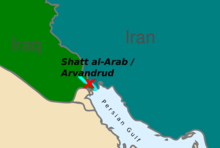| Joint Operation Arvand | |
|---|---|
| Part of the Persian Gulf Conflict and the Cold War | |
 | |
| Location | Shatt al-Arab river, Iran–Iraq border |
| Objective | Escorting Iranian shipping |
| Date | 22–25 April 1969 |
| Executed by |
|
| Outcome | Tensions continued between the two countries until 1975 Algiers Agreement[2] |
| Casualties | None |
The Joint Operation Arvand (Persian: عملیات مشترک اروند, more known by its Persian acronym AMA, عما)[3] was a show of force operation[4] orchestrated in April 1969 by the Imperial Iranian Armed Forces following Iraqi claim for the sovereign right to Shatt al-Arab/Arvand Rud and threatening to block passage of vessels unless they fly the Iraqi flag.[5]
On 22 April 1969, Iranian merchant ship Ebn-e-Sina, carrying a cargo of steel beams and flying Iranian flag, was escorted by Iranian heavily armed naval vessels, as well as jet fighters[6] and proceeded through the river into the Persian Gulf, in an 80-mile journey which took about six hours.[1] However, the Iraqi forces did not attempt to respond as it pledged.[6]
Both countries strengthened their land forces along the river bank, stationing artillery, tanks and anti-aircraft weapons. Iranian troops were positioned in the vicinity of Khorramshahr and Abadan, while Iraq put its forces in Basra on alert. Iranian freighter Arya Far passed through the river escorted by four gunboats three days later, with no disturbance.[6]
As a result, Iraq expelled thousands of Iranian residents and pilgrims from its soil,[4][5] banned import of Iranian goods,[6] and began supporting separatists in Khuzestan and Balochistan.[4]
- ^ a b "Iranian Ship Challenges Iraq Estuary", The Advocate-Messenger, p. 16, 27 April 1969, retrieved 26 October 2017
- ^ Charles P. Wallace (19 August 1988), "Iran, Iraq Still Fail to Bridge Waterway Dispute", Los Angeles Times, retrieved 26 October 2017
- ^ "Dialogue With General Hassani Sadi", Negin-e-Iran (in Persian), 3 (9): 8–40, Summer 2004, archived from the original on 2018-08-01, retrieved 2017-10-25
- ^ a b c Ward, Steven R. (2014). Immortal, Updated Edition: A Military History of Iran and Its Armed Forces. Georgetown University Press. p. 202. ISBN 9781626160651.
- ^ a b Abdulghani, Jasim M. (2012). Iraq and Iran (RLE Iran A). Taylor & Francis. p. 121. ISBN 9781136834264.
- ^ a b c d Stürchler, Nikolas (2007). The Threat of Force in International Law. Cambridge University Press. p. 202. ISBN 9781139464918.